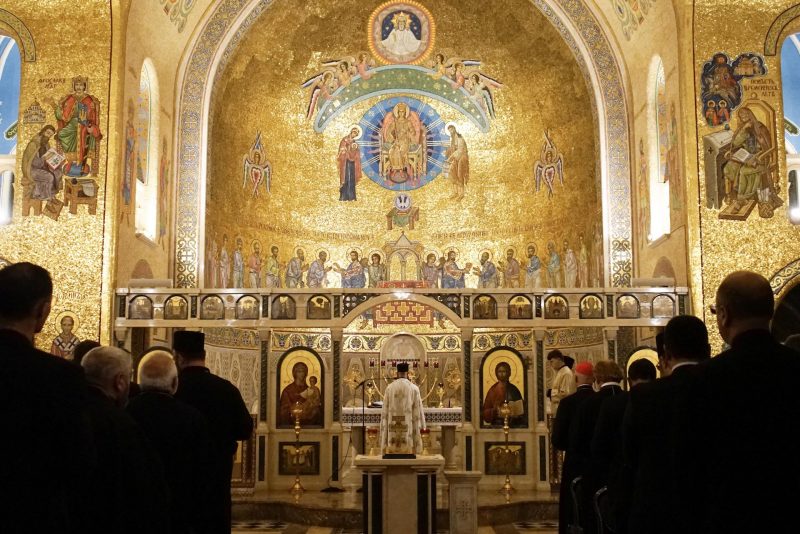From 12 to 14 September the annual meeting of the Eastern Catholic Bishops of Europe took place at the Ukrainian College of St Josaphat in Rome.
At the conference, organized by the CCEE and the Ukrainian Greek-Catholic Church, entitled: “The ecumenical mission of the Eastern Catholic Churches of Europe today”, almost 70 Bishops participated, as well as representatives of the Eastern European Catholic Churches. The work was opened by Cardinal Angelo Bagnasco, President of the CCEE, who hoped that “this meeting can hasten the full unity of all Christians, of which Europe has so much need! May our exchanges and reflections contribute, even modestly, to the fulfillment of the prayer of Jesus Christ that all may be one”. His Beatitude Sviatoslav SHEVCHUK, Archbishop Major of Kyiv-Halič and Father of the Greek-Catholic Church in Ukraine, emphasised the importance for the Eastern Catholic Church of the ecumenical mission and the necessity of “the way we Easterners can be catalysts for ecumenism”.
Numerous speakers were invited to the conference (all their texts are attached), among them Cardinal Leonardo Sandri, Prefect of the Congregation for the Oriental Churches, who reiterated how “the Eastern Catholic Churches are not only caused by some historical contingency but exist by providential design. This means affirming that diversity within the Church is something that reflects a project of God “. Cardinal Kurt Koch, President of the Pontifical Council for Promoting Christian Unity, recalled that” the true objective of the ecumenical movement, that is the reconstruction of the visible unity of the Church and full ecclesial communion, has not yet been achieved and it will probably take much longer to achieve it than had been imagined”. He spoke of the need to identify a common ecumenical object that would allow us to “not stray further from each other ”. Cardinal Pietro Parolin, Secretary of State, spoke of the relationship between diplomacy and ecumenical commitment and how these two dimensions are intimately linked in terms of style and objectives, drawing a common goal: “Work to restore peace where discord reigns, to consider forgiveness as the only effective medicine after centuries of misunderstanding and not forgetting however, that in the Christian, charity never meets without truth ”.
Mgr. Ivan Dacko, President of the Ecumenical Institute of the Catholic University of Leopoli, presented a report on the: “Work of the Mixed Catholic-Orthodox Theological Commission and analysis of the current state of dialogue between the Catholic Church and the Orthodox Churches”. “The Balamand document and the concept of Uniatism” was presented by Rev. P. Frans Bouwen M.Afr., Member of the mixed international Commission for theological dialogue between the Catholic Church and the Orthodox Church.
Al Rev. P. Thomas Pott, OSB, Monk of Chevetogne, Consultor of the Pontifical Council for the Promotion of Christian Unity, was asked to confront the theme of “Proselytizing and religious freedom in the context of Catholic-Orthodox relations”, while Mgr. Markus Graulich, SDB, Undersecretary of the Pontifical Council for Legislative Texts, treated “The theology of the Sacrament of the Eucharist, in the historical context of inter-communion between the Catholic Church and the non-Catholic Eastern Churches”. Finally, Rev. Hyacinthe Destivelle O.P., Official of the Pontifical Council for the Promotion of Christian Unity, examined “The Declaration of Havana and the prospects for its pastoral application in Europe”.
The conference ended, Saturday morning, with the audience that Pope Francis reserved for the participants. To them the Holy Father said to go “forward in the Spirit of communion!” ….“variety within the Church in no way harms its unity; rather it manifests it (Orientalium Ecclesiorum, 2). In fact, Christian unity is not uniformity. Uniformity is the destruction of unity; Christian truth is not monotonous, but “symphonic”; otherwise it would not come from the Holy Spirit.” And he added: “Catholic communion is part of your particular identity, yet it in no way detracts from that identity. On the contrary, it contributes to its full realisation.”
The Eastern Church, the Pope recalls, are custodians of a specific mission in the ecumenical journey. “Today, while all too many inequalities and divisions threaten peace, we feel called to be artisans of dialogue, promoters of reconciliation and patient builders of a civilisation of encounter that can preserve our times from the incivility of conflict. While so many people allow themselves to be caught up in a spiral of violence, in a vicious circle of demands and constant mutual recriminations, the Lord wants us to be meek sowers of the Gospel of love. In the Christian family, you are the ones who, looking to “the God of all consolation” (2Cor 1,3), are committed to healing the wounds of the past, overcoming prejudices and division, and offering hope to all as you walk side by side with your non-Catholic brothers and sisters.”
And he concluded: “most of all, and in everything, let us help each other to live in love with all. Love knows no canonical or jurisdictional boundaries… When we bend over towards a suffering brother or sisters; when we become neighbors to those who endure loneliness and poverty; when we put the marginalised at the centre– children who will not see the light of day, young people deprived of hop, families tested by being broken, or sick or elderly persons who are cast aside – we are already walking together in the love that heals divisions.”

